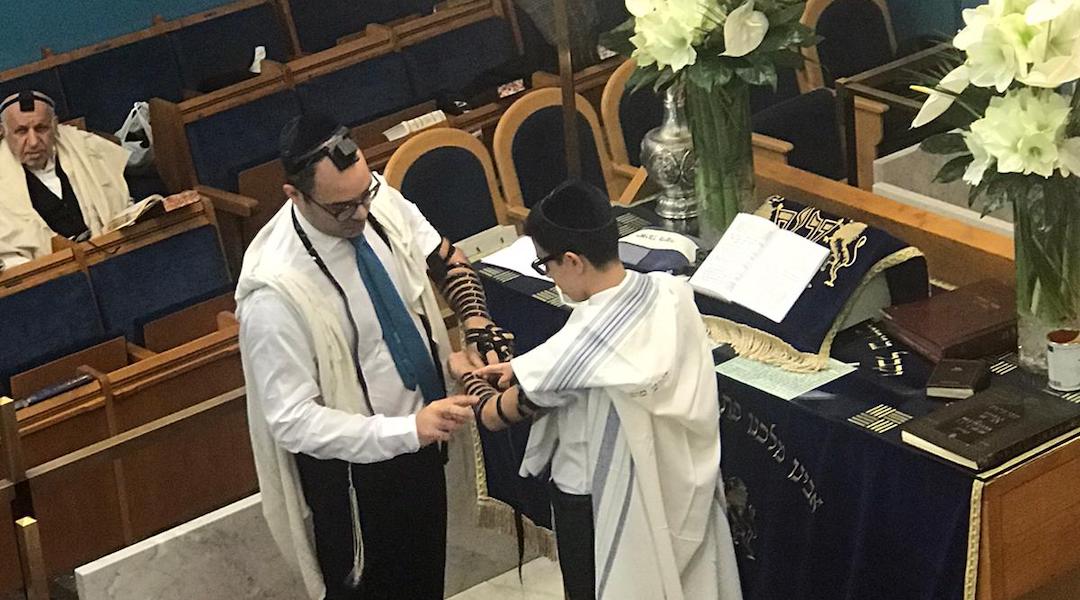(JTA) — Ruben Golran had studied for a year and a half in anticipation of this week, when 600 of his relatives and friends were supposed to converge on Milan to celebrate his bar mitzvah.
First he planned to have a ceremony Tuesday, when he would put on tefillin, a Jewish ritual object, for the first time — a traditional rite of passage. Then it was a blowout party on Thursday night catered by a local kosher Israeli restaurant, and finally another ritual ceremony on Shabbat.
Instead, Ruben’s parents found out Sunday that everything would be canceled. Due to the rapid spread of the coronavirus in northern Italy, regional officials had prohibited large gatherings. A day later, houses of worship were ordered closed.
Within a matter of hours, the family called dozens of relatives across the globe, telling them to cancel their flights. On Tuesday, the tefillin ceremony included just Ruben’s close relatives and no friends instead of the 400 planned guests.
There was no party on Thursday night. Instead, Ruben and his family dined at the Israeli restaurant that was supposed to cater the affair. They’re still not sure what will happen on Shabbat.
“He learned everything, he was ready, he was waiting for the whole family to come and then they said it isn’t happening, the synagogue is closed, you can go with your parents if you want,” said Ruben’s mother, Nethaly Golran. “He made us very proud because through all of this, he was very mature. He never cried. He was sad, but he said, ‘It’s OK. It’s OK, mom. It’ll be OK.’”
Jewish residents of Milan say they felt like the city, Italy’s economic capital, had shut down this week: Soccer matches were canceled, the city’s Duomo — a major tourist attraction — was closed and restaurants were instructed to shut before a national evening drink and snack time called “aperitivo.”
The city’s Jews — some 10,000 — are facing the same challenges as everyone else: Schools are closed, so people are scrambling for childcare even as some of them still go to work. Milan is devoid of tourists, a mega-industry throughout Italy. There was a rush several days ago on grocery stores. The ban on large gatherings persists, and no one is sure when things will return to normal.
“We feel like everyone here in Milan because it’s such a strange, unusual situation,” said Claudia Bagnarelli, who co-founded the local Jewish day school. “Everyone is a little shocked. … Within [the space of] one day, they said the schools are closed and parents have to deal with it.”
The community also has its share of unique challenges: Despite the closure of houses of worship, Jews have tried to convene prayer quorums in apartments in case someone needs to recite the Mourner’s Kaddish. Some students taking a gap year in Israel who returned home for a short break are now stuck in Italy, barred from returning to their programs.
Milan’s official Jewish community organization has canceled its regular classes and programs, including some celebrating Purim. They hope that things will return to normal before the holiday comes on March 10. The community has also set up a task force to assist those who live by themselves and need to get food and other services. The Jewish school is setting up classes via video chat.
“A few people meet in apartments just to make the minyan, but there are no people from outside,” said Milo Hasbani, the president of Milan’s Jewish community. “These are the kind of people who know each other.”
Bar mitzvahs aren’t the only Jewish ceremonies to be affected. A bris on Monday also had to be scaled back. At a normal Milanese bris — unlke their American counterparts, they are often held around noon — more than 100 guests would expect to enjoy a delectable menu of lasagna, ravioli and Italian pastries.
But at this bris, conducted by community mohel Rabbi Shmuel Hezkia in a Milanese synagogue, only a handful of families showed up — and there was no feast to be had.
Hezkia said the whole thing was over quickly. Local officials have instructed Milan’s residents to avoid public gatherings, and the last thing Hezkia wanted was to anger the local government and provoke an investigation of the religious ceremony.
“We thought of doing it in an apartment,” Hezkia said. “But because it was organized, and we had already sent invitations on WhatsApp, we kept it as is.”
Hezkia has said that, except for the ban on gatherings, life has gone on pretty much as normal. The thing he really notices is the lack of tourism.
“Italy and Milan live on tourism, people who go out and spend, and unfortunately that’s missing,” he said. “You can feel they’re missing. We feel that this Shabbat there won’t be a kiddush or guests to invite on Friday night.”
JTA has documented Jewish history in real-time for over a century. Keep our journalism strong by joining us in supporting independent, award-winning reporting.






